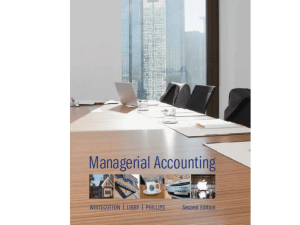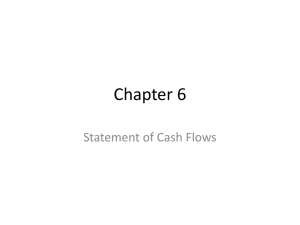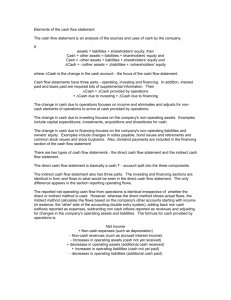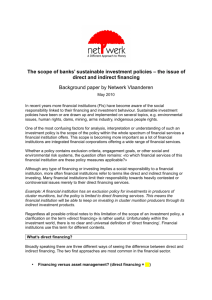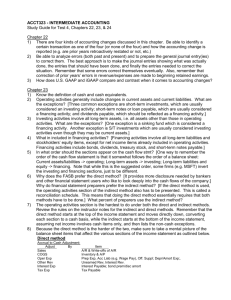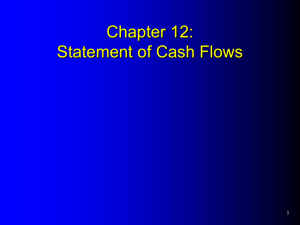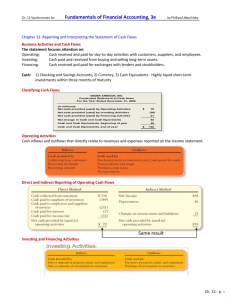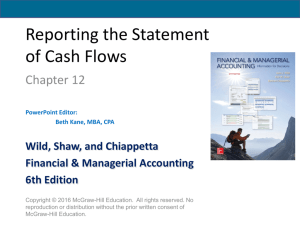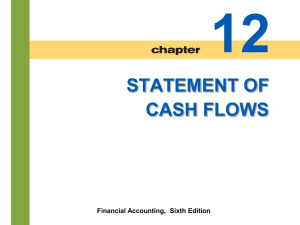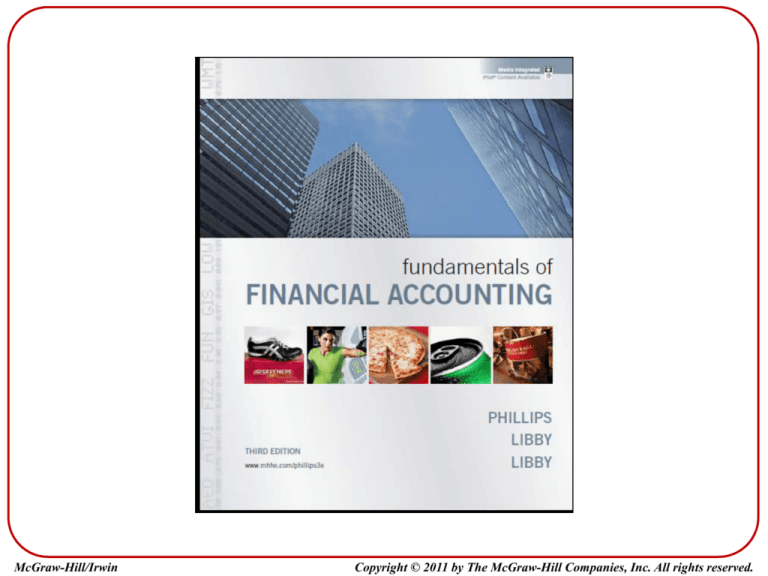
McGraw-Hill/Irwin
Copyright © 2011 by The McGraw-Hill Companies, Inc. All rights reserved.
Chapter 12
Reporting and Interpreting
the Statement of Cash Flows
PowerPoint Authors:
Susan Coomer Galbreath, Ph.D., CPA
Charles W. Caldwell, D.B.A., CMA
Jon A. Booker, Ph.D., CPA, CIA
Fred Phillips, Ph.D., CA
Business Activities and Cash Flows
The Statement of
Cash Flows focuses
attention on:
Operations
Cash received and paid
for day-to-day activities
with customers, suppliers,
and employees.
Investing
Cash paid and received
from buying and selling
long-term assets.
12-3
Financing
Cash received and paid
for exchanges with
lenders and stockholders.
Business Activities and Cash Flows
Checking and
Savings
Accounts
Cash
Currency
Cash Equivalents
Highly liquid short-term investments
within three months of maturity.
12-4
Operating Activities
Cash inflows and outflows that directly relate
to revenues and expenses reported on the
income statement.
12-5
Investing Activities
Under Armour’s 2008 Investing Activities
12-6
Financing Activities
Under Armour’s 2008 Financing Activities
12-7
Relationships Between Classified
Balance Sheet and Statement of Cash
Flow (SCF) Categories
SCF Categories
Operating
Current Assets
Current Liabilities
Investing
Noncurrent Assets
Noncurrent Liabilities
Financing
12-8
Classified Balance Sheet Categories
Stockholders' Equity
Relationship to Other Financial
Statements
Information needed to prepare a statement
of cash flows:
Comparative Balance Sheets.
Income Statement.
Additional details concerning
selected accounts.
12-9
Relationship to Other Financial
Statements
Recall that the basic Balance Sheet equation is:
We can recast the equation as follows:
The following equation is true:
From this basic Balance Sheet equation, we
develop our model to solve for the change in cash:
12-10
Cash Flows from Operating
Activities - Indirect Method
The indirect method adjusts net income
by analyzing noncash items.
Changes in current assets
and current liabilities.
Cash Flows
from Operating
Activities Indirect Method
Net
Income
+ Noncash
expenses such as
depreciation and
amortization.
12-11
+ Losses and
- Gains
Relationships to the Balance
Sheet and the Income Statement
Change in account
balances during the year
Increase
Decrease
Current Assets
Subtract from
net income.
Add to
net income.
Current Liabilities
Add to
net income.
Subtract from
net income.
Use this table when adjusting Net Income to Operating
Cash Flows using the indirect method.
12-12
Direct and Indirect Reporting
of Operating Cash Flows
Net Income
Items included in net income that do not involve cash
+ Depreciation
Changes in operating assets and liabilities
+ Decreases
Changes inincurrent
currentassets
assetsand current liabilities:
– Increases in current assets
– Decreases in current liabilities
+ Increases in current liabilities
Net cash provided (used) by operating activities
When using the indirect method, start with accrual basis
net income and adjust it for:
1. items that are included in net income but do not
involve cash, and
2. items that are not included in net income but do
involve cash.
12-13
Evaluating Cash Flows
• Operating cash flows
must be positive over the
long-run for a company to
be successful.
• An upward trend in
operating cash flows over
time indicates growth and
efficient operations.
12-14
Evaluating Cash Flows
Quality of
Income
Ratio
=
Net Cash Flow from Operating Activities
Net Income
A measure for determining what portion of
a company’s income was generated in cash.
A ratio near 1.0 indicates a high likelihood that
revenues are realized in cash and that expenses
are associated with cash outflows.
Quality of
Income
Ratio
12-15
=
79
38
= 2.08 for Under Armour in 2008
Evaluating Cash Flows
Capital
Acquisitions =
Ratio
Net Cash Flow from Operating Activities
Cash Paid for Property, Plant, and Equipment
A measure for determining whether a company is generating
enough cash internally to purchase long-term assets.
A ratio greater than 1.0 indicates that outside
financing was not needed to purchase long-term assets.
Capital
Acquisitions =
Ratio
12-16
79
36
= 2.19 for Under Armour in 2008
Reporting Operating Cash Flows
with the Direct Method
12-17
Provides more
detailed information
Identifies cash
inflows and
outflows
relationships
Prepared by
adjusting accrual
basis to cash basis
Investing and
financing sections
for the two methods
are identical
Reporting Sales of Property, Plant,
and Equipment (PPE) (Indirect)
Depreciation
Expense
Loss on Sale
of PPE
Gain on Sale
of PPE
12-18
A loss on the sale of PPE is added
back to net income just as
depreciation expense is added back.
Adding these noncash items restores
net income to what it would have been
had depreciation and the loss not
been subtracted at all.
Just the opposite is true for a gain on
the sale of PPE. Subtracting the gain
reverses the effect of the gain having
been added to net income.
End of Chapter 12

